
Anolis oculatus, the Dominica anole, Dominican anole, eyed anole or zandoli, is a species of anole lizard. It is endemic to the Caribbean island of Dominica, where it is found in most environments. The species is found in a diverse range of color forms, which one herpetologist once classified as four subspecies, which most other scientists did not recognise because the forms gradually inter-grade with one another. Two later researchers have instead promoted the "ecotypes" concept, hypothesizing the color forms are maintained by the ecological conditions of the surrounding environment, despite being genetically indistinguishable. The morphology of some traits is subject to clinal variation, gradually changing from one side of the island to the other, or from sea level to the hilltops. The ground color ranges from pale tan or yellow to deep green or brown. It also has patterned markings that range from light-colored speckling to complex marbled patterns, and some populations also have large black-ringed "eye" spots on their flanks.

The Dominican ground lizard or Dominican ameiva is a species of lizard. It is endemic to the Caribbean island of Dominica, an island noted for its intact and abundant reptile population, where it is most commonly found in dry coastal woodland.

Pholidoscelis plei, known commonly as the Anguilla Bank ameiva or the Caribbean ameiva, is a species of lizard in the family Teiidae. The species is found on the Caribbean islands of Anguilla, Saint Martin, and Saint Barthélemy in the Lesser Antilles. Its coloration and markings vary between each island population. Two subspecies are recognized as being valid, including the nominotypical subspecies.

The British Virgin Islands dwarf sphaero, Virgin Gorda least gecko, or Virgin Islands dwarf gecko is a species of gecko and also one of the smallest terrestrial vertebrates. It has only been found on three of the British Virgin Islands: Virgin Gorda, Tortola, and Moskito Island. It was discovered in 1964 and is suspected to be a close relative of Sphaerodactylus nicholsi, a dwarf sphaero from the nearby island of Puerto Rico. It shares its range with the big-scaled least gecko (S. macrolepis), which is found in leaf litter. Unlike this larger gecko, the Virgin Islands dwarf sphaero lives on drier hillsides, yet prefers moist microhabitats found under rocks because it lacks the adaptations necessary for preventing water loss, which is a significant problem due to its small body size.
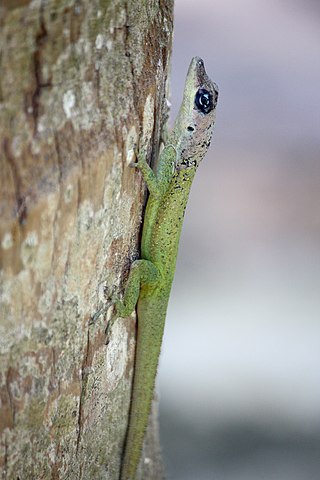
The Barbados anole is a species of anole lizard that is native to Barbados, an island-nation in the Caribbean. Originally endemic to Barbados, it has since been introduced to Saint Lucia and Bermuda. It was previously treated as a subspecies of Martinique's anole, A. roquet.
The Dominican blind snake or Dominican worm snake is a species of blind snake that is endemic to the Caribbean island-nation of Dominica, in the Lesser Antilles.

The fantastic least gecko, or fantastic sphaero is a species of gecko found in the Caribbean, on the islands of Dominica, Montserrat, and the Guadeloupe archipelago.
Vincent's least gecko is a species of lizard in the family Sphaerodactylidae. The species is endemic to the Caribbean.

The Barbados leaf-toed gecko is a species of gecko endemic to the Caribbean island-nation of Barbados. It is the only known leaf-toed gecko in the Lesser Antilles.
Sphaerodactylus parvus is a gecko endemic to the Anguilla Bank of islands in the Lesser Antilles, which comprises Anguilla, Saint Martin, and Saint Barthélemy. It was elevated to species level in 2001, formerly described as a subspecies of S. macrolepis.

The island least gecko is a species of gecko endemic to the Lesser Antilles in the Caribbean.
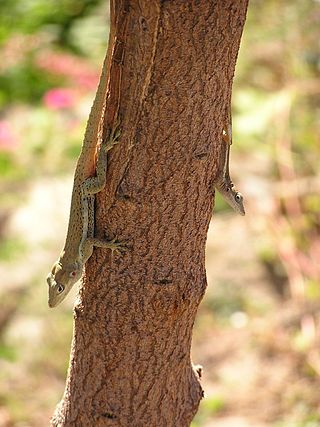
Anolis gingivinus, also known as the Anguilla Bank tree anole, Anguilla bank anole, and Anguilla anole, is a species of anole lizard that is endemic to the Caribbean Lesser Antilles islands of Anguilla and its satellites, such as Saint Martin, and Saint Barthélemy.
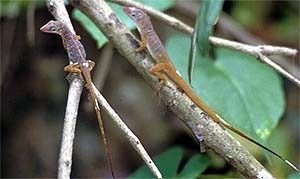
Anolis pogus, the St. Martin anole, Anguilla Bank bush anole or bearded anole, is a species of anole lizard from the Caribbean island of Saint Martin, located in the Lesser Antilles. Its range used to include Anguilla, but it is now extirpated there. It may also have occurred on Saint Barthélemy.
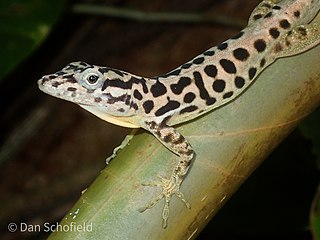
Anolis sabanus, the Saba anole or Saban anole, is a species of anole lizard that is endemic to the island of Saba, a Dutch municipality in the Caribbean Lesser Antilles.

The Saba least gecko is a gecko endemic to the Lesser Antilles in the Caribbean, where it can be found on Saba, Sint Eustatius, Saint Kitts, and Nevis.
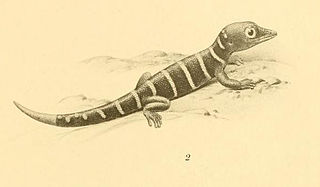
The Antigua least gecko is a gecko endemic to the island nation of Antigua and Barbuda in the Caribbean Lesser Antilles, where it is found on both main islands.

Anolis roquet, also called Martinique anole, Martinique's anole, or savannah anole, is a species of anole lizard. It is endemic to the island of Martinique, located in the Caribbean Lesser Antilles.
Sphaerodactylus kirbyi, commonly known as the Bequia dwarf gecko, the Bequia sphaero, or the Grenadines sphaero, is a species of gecko, a lizard in the family Sphaerodactylidae. The species is endemic to Bequia, an island in the Grenadines that is part of Saint Vincent and the Grenadines.

The Grenada bush anole or bronze anole is a species of anole lizard found in the Caribbean Lesser Antilles and South America. It is distributed on Grenada and throughout the Grenadines islands, and it has been introduced to Trinidad and Tobago. It can also be found in Guyana on the mainland, where it is locally abundant, though these populations are not native, either.















